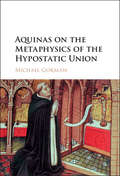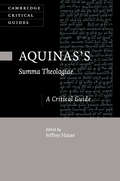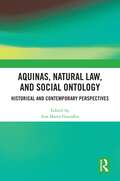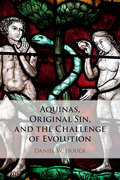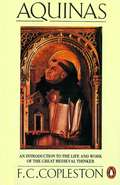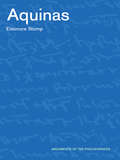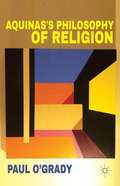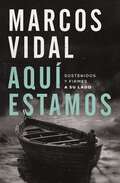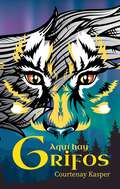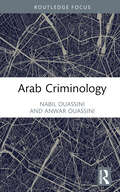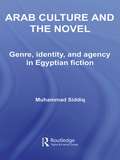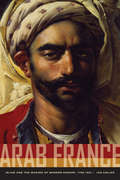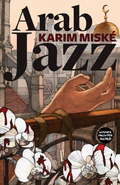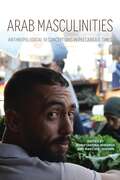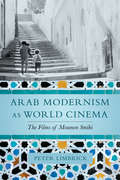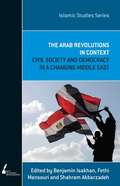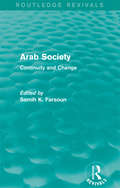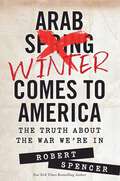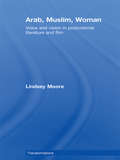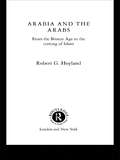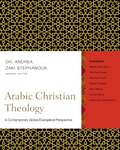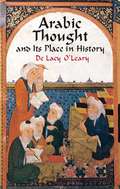- Table View
- List View
Aquinas on the Metaphysics of the Hypostatic Union
by Michael GormanThe hypostatic union of Christ, namely his being simultaneously human and divine, is one of the founding doctrines of Christian theology. In this book Michael Gorman presents the first full-length treatment of Aquinas's metaphysics of the hypostatic union. After setting out the historical and theological background, he examines Aquinas's metaphysical presuppositions, explains the basic elements of his account of the hypostatic union, and then enters into detailed discussions of four areas where it is more difficult to get a clear understanding of Aquinas's views, arguing that in some cases we must be content with speculative reconstructions that are true to the spirit of Aquinas's thought. His study pays close attention to the Latin texts and their chronology, and engages with a wide range of secondary literature. It will be of great interest to theologians as well as to scholars of metaphysics and medieval thought.
Aquinas's Summa Theologiae: A Critical Guide (Cambridge Critical Guides)
by Jeffrey HauseAlone among Thomas Aquinas's works, the Summa Theologiae contains well-developed and integrated discussions of metaphysics, ethics, law, human action, and the divine nature. The essays in this volume, by scholars representing varied approaches to the study of Aquinas, offer thorough, cutting-edge expositions and analyses of these topics and show how they relate to Aquinas's larger system of thought. The volume also examines the reception of the Summa Theologiae from the thirteenth century to the present day, showing how scholars have understood and misunderstood this key text, and how, even after seven centuries of interpretation, we still have much to learn from it. Detailed and accessible, this book will be highly important for scholars and students of medieval philosophy and theology.
Aquinas, Bonaventure, and the Scholastic Culture of Medieval Paris: Preaching, Prologues, and Biblical Commentary
by Randall SmithIn this volume, Randall B. Smith provides a revisionist account of the scholastic culture that flourished in Paris during the High Middle Ages. Exploring the educational culture that informed the intellectual and mental habits of Thomas Aquinas and Bonaventure, he offers an in-depth study of the prologues and preaching skills of these two masters. Smith reveal the intricate interrelationships between the three duties of the master: lectio (reading), disputatio (debate), and praedicatio (preaching). He also analyzes each of Aquinas and Bonaventure's prologues from their student days to their final works, revealing both their artistry and their instructional character. Written in an engaging style, this book serves as an invaluable resource that will enable scholars and students to read thirteenth-century sermons, prologues, and biblical commentaries with greater understanding and ease.
Aquinas, Natural Law, and Social Ontology: Historical and Contemporary Perspectives
by Ana Marta GonzálezThis volume explores the connections between Thomas Aquinas’ doctrine of natural law and contemporary social thought. It aims to make explicit the basic notions of Thomas Aquinas’ social ontology and to show how key concepts from sociology, economics, and political science relate to his ethics and social thought.Social ontology is a growing area of contemporary social theory. Scholars in this area reflect on the ontological status of society and the various realities that make up the social realm. However, Aquinas scholars rarely use the term social ontology, instead resorting to his natural law to examine social life. This volume argues that the social thought of Thomas Aquinas, including his natural law theory, implies a social ontology. Aquinas adopts a clear position on the ontological uniqueness of human beings, the intentional structure of human action, and the existence of informal social relations and institutional realities that shape human society. This volume shows how these views can be reconstructed into a coherent social ontology. Its chapters are divided into five thematic parts. Part 1 offers conceptual elements to bridge the gap between Aquinas and contemporary social theory. Part 2 considers the metaphysics and theology implicit in Aquinas’ social ontology. Part 3 focuses on the way this ontology is at work in his account of the common good and his approach to natural law. Part 4 expands this reflection to economics. Finally, Part 5 addresses legal and political issues such as political polarization, family law, and the ethics of war.Aquinas, Natural Law, and Social Ontology will appeal to scholars and graduate students interested in the thought of Thomas Aquinas, social and political philosophy, contemporary social theory, Catholic theology, and the social sciences.
Aquinas, Original Sin, and the Challenge of Evolution
by Daniel W. HouckIs original sin compatible with evolution? Many today believe the answer is 'No'. Engaging Aquinas's revolutionary account of the doctrine, Daniel W. Houck argues that there is not necessarily a conflict between this Christian teaching and mainstream biology. He draws on neglected texts outside the Summa Theologiae to show that Aquinas focused on humanity's loss of friendship with God - not the corruption of nature (or personal guilt). Aquinas's account is theologically attractive in its own right. Houck proposes, moreover, a new Thomist view of original sin that is consonant with evolution. This account is developed in dialogue with biblical scholarship on Jewish hamartiology and salient modern thinkers (including Kant, Schleiermacher, Barth, and Schoonenberg), and it is systematically connected to debates over nature, grace, the desire for God, and justification. In addition, the book canvasses a number of neglected premodern approaches to original sin, including those of Anselm, Abelard, and Lombard.
Aquinas: A Beginner's Guide (Beginner's Guides)
by Edward FeserOne of the most influential philosophers and theologians in history, St. Thomas Aquinas was the father of modern philosophy of religion, and is infamous for his "proofs" for God's existence. In this cogent introduction to the great Saint's work, Edward Feser argues that you cannot fully understand Aquinas' philosophy without his theology and vice versa. Covering his thoughts on the soul, natural law, metaphysics, and the interaction of faith and reason, this will prove indispensable for students, experts or the general reader.
Aquinas: An Introduction to the Life and Work of the Great Medieval Thinker
by F. CoplestonAquinas (1224-74) lived at a time when the Christian West was opening up to a wealth of Greek and Islamic philosophical speculation. An embodiment of the thirteenth-century ideal of a unified interpretation of reality (in which philosophy and theology work together in harmony), Aquinas was remarkable for the way in which he used and developed this legacy of ancient thought—an achievement which led his contemporaries to regard him as an advanced thinker. Father Copleston's lucid and stimulating book examines this extraordinary man—whose influence is perhaps greater today than in his own lifetime—and his thought, relating his ideas wherever possible to problems as they are discussed today.
Aquinas: Essays In Honor Of Norman Kretzmann (Arguments of the Philosophers)
by Eleonore StumpFew philosophers or theologians exerted as much influence on the shape of medieval thought as Thomas Aquinas. He ranks amongst the most famous of the Western philosophers and was responsible for almost single-handedly bringing the philosophy of Aristotle into harmony with Christianity. He was also one of the first philosophers to argue that philosophy and theology could support each other. The shape of metaphysics, theology, and Aristotelian thought today still bears the imprint of Aquinas' work.In this extensive and deeply researched study, Eleonore Stump examines Aquinas' major works, Summa Theologiae and Summa Contra Gentiles, and clearly assesses the vast range of Aquinas' thought. Philosophers, theologians, and students of the medieval period alike will find this unrivalled study an indispensable resource in researching and teaching Aquinas.
Aquinas’s Philosophy of Religion
by Paul O’GradyThis is an exploration and analysis of Aquinas's contribution to the philosophy of religion. It examines Aquinas's contexts, his views on philosophy and theology, as well as faith and reason. His arguments for God's existence, responses to objections against God's existence and his characterization of the nature of God are examined.
Aquí estamos: Sostenidos y firmes a su lado
by Marcos VidalExperimenta la transformación que resulta de decir «SÍ» a Jesús: eligiendo compromiso sobre excusas, fe sobre dudas y acción sobre vacilación. ¿Qué motiva a alguien a servir al Señor durante años? ¿Qué cualidades especiales se necesitan? ¿Es factible para cualquiera seguir ese camino? Este libro responde estas y otras preguntas que todos los seguidores de Cristo nos planteamos.En Aquí estamos, Marcos Vidal, pastor, cantante y autor reconocido, te invita a una exploración sincera y personal para revitalizar tu compromiso con Jesucristo, sin importar tu profesión, educación o talentos.Este libro es para aquellos que:Se sientan desanimados e intimidados en su camino con JesúsTienen dudas y no saben por dónde ni cómo empezarTemen no poder cumplir con el SeñorCon una profunda sabiduría bíblica, compasión genuina e historias personales, Vidal revela la inquebrantable verdad de que Dios te espera pacientemente, dondequiera que estés.El momento es AHORA, el mensaje es claro: si Él te llamó, ¡claro que puedes! No mires atrás. Después de leer este libro, responderás con confianza: «¡Por la gracia de Dios, AQUÍ ESTAMOS!»Here We AreExperience the transformation that results from saying &“YES&” to Jesus: choosing commitment over excuses, faith over doubt and action over hesitation.What motivates someone to serve the Lord for years? What special qualities are needed? Is it feasible for anyone to follow that path? This book answers these and other questions that all followers of Christ ask themselves.In Here We Are, Marcos Vidal, pastor, singer, and renowned author, invites you to a sincere and personal exploration to revitalize your commitment to Jesus Christ, regardless of your profession, education, or talents.This book is for those who:Feel discouraged and intimidated in their walk with JesusHave doubts and don&’t know where or how to beginFear they will not be able to live up to the LordWith profound biblical wisdom, genuine compassion, and personal stories, Vidal reveals the unshakable truth that God is patiently waiting for you, no matter where you stand.The time is NOW, the message is clear: if He called you, of course you can! Don't look back. After reading this book, you will respond with confidence, &“By the grace of God, HERE WE ARE!&”
Aquí hay Grifos (Más allá del ciclo del viento del norte #1)
by Courtenay KasperAquí hay Grifos (Más allá del cliclo de los Vientos del Norte Libro 1) (2020) - Cuando Molybdenum McTavish, de 12 años, encuentra un huevo de grifo en el patio de remolques de su abuelo, se ve envuelta en una aventura vertiginosa que la lleva más allá del viento del norte y fuera de su propio mapa. Moly debe descubrir quién es y en quién puede confiar antes de que el último de los grifos sea brutalmente asesinado y la gente de Hyperborea se convierta en esclava. ¿Pueden una niña y su grifo tigre recién nacido derrotar a una horda de Arim tuerto antes de que sea demasiado tarde?
Aquí, Allí y En Todas Partes: El hombre que vio el Futuro
by Avlon McCreadieSoy Paul. No estoy seguro de qué pasó, pero desperté y todo en mi mundo era diferente. No sé cómo interpretarlo. Todos actúan como si esto fuese normal. Como si siempre hubiese sido así. Parece que soy el único que sabe que no es así. Solo no sé qué hacer al respecto.
Arab Criminology (Criminology in Focus)
by Nabil Ouassini Anwar OuassiniThe objective of Arab Criminology is to establish a criminological sub-field called ‘Arab Criminology.’ The ever-evolving field of criminology has advanced in the past decade, yet many impediments remain. Unlike criminology in Africa, Asia, the Americas, Europe, and Oceania based merely on geopolitical constructs, the Arab world has unique commonalities that do not exist in the other established sub-fields on criminology. The Arab world has largely remained in criminology’s periphery despite the region’s considerable importance to current international affairs. In response, this book explores two main questions: Why should we and how do we establish a sub-field in Arab Criminology? The authors examine the state of criminology in the Arab world, define its parameters, and present four components that bond and distinguish Arab criminology from other criminological area studies. They then identify the requirements for establishing Arab criminology and detail how local, regional, and international researchers can collaborate, develop, and expand the sub-field. Arab Criminology will challenge some of the recurrent Orientalist and Islamophobic tropes in Northern criminology and progress the discipline of criminology to reflect a more diverse focus that embraces regions from the Global South. Presenting compelling arguments and examples that support the establishment of this sub-field, Arab Criminology will be of great interest to Criminology, Criminal Justice, Legal Studies, and Middle Eastern/North African studies scholars, particularly those working on Southern Criminology, Comparative Criminology, International Criminal Justice Systems, and Arab studies.
Arab Culture and the Novel: Genre, Identity and Agency in Egyptian Fiction (Routledge Studies in Middle Eastern Literatures #Vol. 16)
by Muhammad SiddiqThis book explores the complex relationship between the novel and identity in modern Arab culture against a backdrop of contemporary Egypt. It uses the example of the Egyptian novel to interrogate the root causes – religious, social, political, and psychological – of the lingering identity crisis that has afflicted Arab culture for at least two centuries.
Arab France
by Ian CollerMany think of Muslims in Europe as a twentieth century phenomenon, but this book brings to life a lost community of Arabs who lived through war, revolution, and empire in early nineteenth century France. Ian Coller uncovers the surprising story of the several hundred men, women, and children--Egyptians, Syrians, Greeks, and others--who followed the French army back home after Napoleon's occupation of Egypt. Based on research in neglected archives, on the rediscovery of forgotten Franco-Arab authors, and on a diverse collection of visual materials, the book builds a rich picture of the first Arab France--its birth, rise, and sudden decline in the age of colonial expansion. As he excavates a community that was nearly erased from the historical record, Coller offers a new account of France itself in this pivotal period, one that transcends the binary framework through which we too often view history by revealing the deep roots of exchange between Europe and the Muslim world, and showing how Arab France was in fact integral to the dawn of modernity.
Arab Jazz
by Karim MiskéKosher sushi, kebabs, a second hand bookshop and a bar: the 19th arrondissement in Paris is a cosmopolitan neighbourhood where multicultural citizens live, love and worship alongside one another. This peace is shattered when Ahmed Taroudant's melancholy daydreams are interrupted by the blood dripping from his upstairs neighbour's brutally mutilated corpse. The violent murder of Laura Vignole, and the pork joint placed next to her, set imaginations ablaze across the neighborhood, and Ahmed finds himself the prime suspect. However detectives Rachel Kupferstein and Jean Hamelot are not short of leads. What is the connection between a disbanded hip-hop group and the fiery extremist preachers that jostle in the streets for attention? And what is the mysterious new pill that is taking the district by storm? In this his debut novel, Karim Miské demonstrates a masterful control of setting, as he moves seamlessly between the sensual streets of Paris and the synagogues of New York to reveal the truth behind a horrifying crime.
Arab Masculinities: Anthropological Reconceptions in Precarious Times (Public Cultures of the Middle East and North Africa)
by Laura Ferrero Alice Elliot Jamie Furniss Bård Helge Kårtveit Hsain Ilahiane Anne Hovgaard Jørgensen Gustavo Barbosa Sabiha Allouche Lisa L. WynnArab Masculinities provides a groundbreaking analysis of Arab men's lives in the precarious aftermath of the 2011 Arab uprisings. It challenges received wisdoms and entrenched stereotypes about Arab men, offering new understandings of rujula, or masculinity, across the Middle East and North Africa.The 10 individual chapters of the book foreground the voices and stories of Arab men as they face economic precarity, forced displacement, and new challenges to marriage and family life. Rich in ethnographic details, they illuminate how men develop alternative strategies of affective labor, how they attempt to care for themselves and their families within their local moral worlds, and what it means to be a good son, husband, father, and community member. Arab Masculinities sheds light on the most private spaces of Arab men's lives—offering stories that rarely enter the public realm. It is a pioneering volume that reflects the urgent need for new anthropological scholarship on men and masculinities in a changing Middle East.
Arab Modernism as World Cinema: The Films of Moumen Smihi
by Peter LimbrickArab Modernism as World Cinema explores the radically beautiful films of Moroccan filmmaker Moumen Smihi, demonstrating the importance of Moroccan and Arab film cultures in histories of world cinema. Addressing the legacy of the Nahda or "Arab Renaissance" of the nineteenth and early twentieth century—when Arab writers and artists reenergized Arab culture by engaging with other languages and societies—Peter Limbrick argues that Smihi’s films take up the spirit of the Nahda for a new age. Examining Smihi’s oeuvre, which enacts an exchange of images and ideas between Arab and non-Arab cultures, Limbrick rethinks the relation of Arab cinema to modernism and further engages debates about the use of modernist forms by filmmakers in the Global South. This original study offers new routes for thinking about world cinema and modernism in the Middle East and North Africa, and about Arab cinema in the world.
Arab Revolutions in Context: Civil Society and Democracy in a Changing Middle East (Islamic Studies Series)
by Fethi Mansouri Shahram Akbarzadeh Benjamin IsakhanFrom late 2010 a series of dramatic and unprecedented events swept across the Middle East and North Africa, toppling several autocratic regimes that had held power for decades and ushering in a new climate of dissent and democratisation. The Arab Revolutions in Context seizes a unique opportunity to reflect on these seismic events, their causes and consequences, and the core issues facing the region as it moves forward. This volume is more than a collection of detailed thematic essays.It situates the Arab Revolutions within their broader contextual backgrounds—showing that a unique set of historical events, as well as local, regional and global dynamics, has converged to provide the catalyst that triggered the recent revolts-and also within a new conceptual framework. The argument here is that the Arab Revolutions pose a very specific challenge to conventional wisdom concerning democracy and democratisation in the Middle East. The Arab Revolutions in Context is the first volume of its kind to address the Arab Revolutions and the varying analyses, debates and discussions that they have stimulated. Islamic Studies Series - Volume 12
Arab Society: Continuity and Change (Routledge Revivals)
by Samih K. FarsounThe Arab world has long been subjected to super-power rivalry for influence and control. The area has been characterized by bloody conflict with Israel and the internal instability that has been particularly prevalent in the last few years. Whilst these political struggles have been highly visible and at times spectacular over the decades, other transformations have taken place within the societies and peoples of the region, on a less pronounced – although just as profound – scale. The integration of the region into the world economy and the spread of Islamic revivalism are perhaps the most significant of these transformations. This volume, inspired by a lecture series on the Arab world in transition at the American University, Washington D.C., was first published in 1985. It discusses a wide range of issues, from economic to religious, which together form an in-depth analysis of the complex processes of transformation in Arab society. This is a fascinating work that holds the same interest and value to scholars and students of Middle Eastern history, politics and domestic affairs, as it did when it was first published.
Arab Winter Comes to America: The Truth About the War We're In
by Robert SpencerOverlooked by our media, purposely obscured by our own government, and unnoticed by the vast majority of Americans, the turmoil of the Islamic world's "Arab Spring" has become an "Arab Winter," bringing new threats of terror to America. New York Times bestselling author Robert Spencer, an expert on Islam and terrorism, reveals why America is shockingly unequipped to face this threat. In Arab Winter Comes to America: The Truth about the War We're In, you'll learn why the Obama administration has opted to appease rather than confront Islamic extremists in the United States; how Muslim organizations are pressuring witnesses to terror crimes not to cooperate with authorities; why the Justice Department has buried select news stories; and much, much more.The "Arab Spring" uncorked a jihadist genie in North Africa and the Middle East. It is about to wreak its mayhem here, with renewed terrorism. Americans need to inform themselves of the threat-and ensure that their elected government in Washington takes action. Robert Spencer's Arab Winter Comes to America sounds the alarm and shows what needs to be done. It is essential reading.
Arab, Muslim, Woman: Voice and Vision in Postcolonial Literature and Film (Transformations)
by Lindsey MooreGiven a long history of representation by others, what themes and techniques do Arab Muslim women writers, filmmakers and visual artists foreground in their presentation of postcolonial experience? Lindsey Moore’s groundbreaking book demonstrates ways in which women appropriate textual and visual modes of representation, often in cross-fertilizing ways, in challenges to Orientalist/colonialist, nationalist, Islamist, and ‘multicultural’ paradigms. She provides an accessible but theoretically-informed analysis by foregrounding tropes of vision, visibility and voice; post-nationalist melancholia and mother/daughter narratives; transformations of ‘homes and harems’; and border crossings in time, space, language, and media. In doing so, Moore moves beyond notions of speaking or looking ‘back’ to encompass a diverse feminist poetics and politics and to emphasize ethical forms of representation and reception. Aran, Muslim, Woman is distinctive in the eclectic body of work that it brings together. Discussing Algeria, Egypt, Jordan, Lebanon, Morocco, the Palestinian territories, and Tunisia, as well as postcolonial Europe, Moore argues for better integration of Arab Muslim contexts in the postcolonial canon. In a book for readers interested in women's studies, history, literature, and visual media, we encounter work by Assia Djebar, Mona Hatoum, Fatima Mernissi, Ahlam Mosteghanemi, Nawal el Saadawi, Leila Sebbar, Zineb Sedira, Ahdaf Soueif, Moufida Tlatli, Fadwa Tuqan, and many other women.
Arabia and the Arabs: From the Bronze Age to the Coming of Islam
by Robert G. HoylandLong before Muhammed preached the religion of Islam, the inhabitants of his native Arabia had played an important role in world history as both merchants and warriorsArabia and the Arabs provides the only up-to-date, one-volume survey of the region and its peoples, from prehistory to the coming of IslamUsing a wide range of sources - inscriptions, poetry, histories, and archaeological evidence - Robert Hoyland explores the main cultural areas of Arabia, from ancient Sheba in the south, to the deserts and oases of the north. He then examines the major themes of*the economy*society*religion*art, architecture and artefacts*language and literature*Arabhood and ArabisationThe volume is illustrated with more than 50 photographs, drawings and maps.
Arabic Christian Theology: A Contemporary Global Evangelical Perspective
by ZondervanTheology is not done in a vacuum. Our theology is affected by the culture in which we live, and our theology can have unexpected effects on the lives of Christians who live thousands of miles away. This point emerges clearly as we listen to seven Arabic evangelical theologians address issues that are of critical importance to Christians living as minorities in the Muslim world. North American readers may find that many of their assumptions are challenged as they see how respected Christian thinkers from a very different context address issues of biblical interpretation, national and international politics, culture and gender.
Arabic Thought and Its Place in History
by De Lacy O'LearyWell-documented study of the mutual influence of Arabic and Western worlds during the Middle Ages traces the transmission of Greek philosophy and science to the Islamic cultures. A fascinating portrait of medieval Muslim thought, it illustrates commonalities with Judaic and Christian teachings as well as points of divergence.
